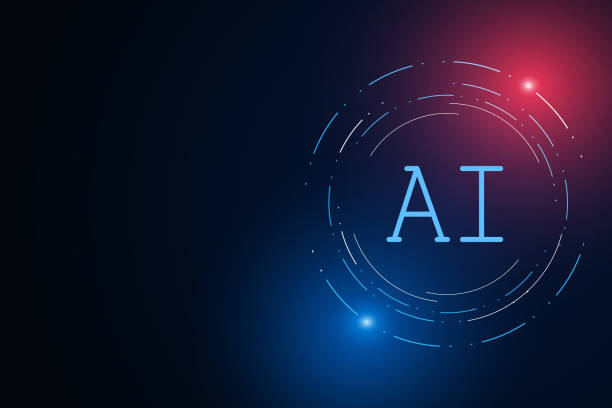The Importance of E-commerce Website Design in the Digital Age
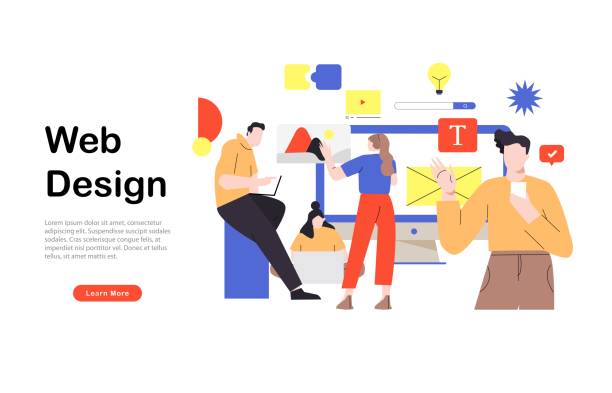
In today’s world, where information and communication technology lies at the heart of every business, e-commerce website design is no longer a luxury option, but an indispensable necessity for survival and growth.
The recent pandemic and changing consumer habits have highlighted the need for a powerful online presence more than ever.
An e-commerce website is a window to an endless market, eliminating geographical limitations and providing access to customers worldwide.
This platform not only allows you to offer your products and services 24/7, but also provides a basis for building deeper connections with your audience and analyzing their behavior.
#E-commerce_website_design helps businesses achieve greater efficiency by reducing physical operational costs and move towards a brighter future in #e-commerce.
With a professional #online_store, you can strengthen your brand, build customer trust, and provide them with a unique shopping experience.
This digital platform is the backbone of modern #digital_business, without which, competing in today’s challenging market would be nearly impossible.
Investing in e-commerce website design is, in fact, an investment in the future of your business.
Dissatisfied with your e-commerce website’s low sales?
Rasawweb is your solution for having a professional and high-selling e-commerce website.
✅ Significant increase in sales and revenue
✅ Easy and enjoyable shopping experience for customers
⚡ Get free consultation from Rasawweb right now!
Key Steps in Designing an Efficient E-commerce Website
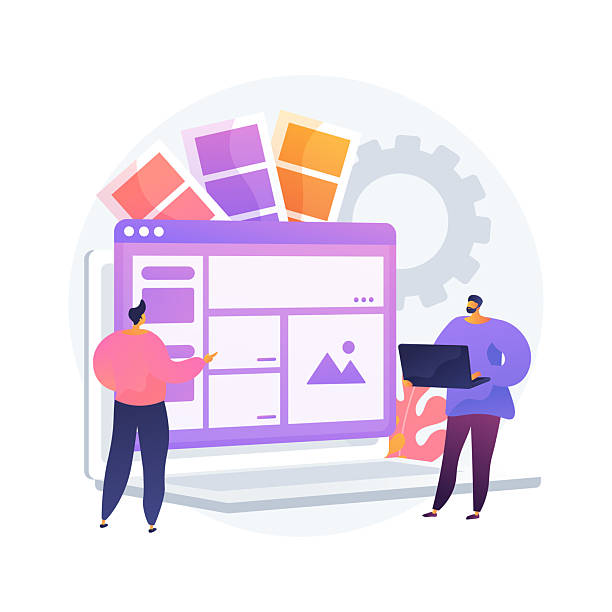
Designing an efficient e-commerce website requires meticulous planning and step-by-step execution to ensure that the final website meets business needs and provides an excellent user experience.
The first step is market research and analysis; a thorough understanding of target audiences, competitors, and their strengths and weaknesses is the foundation of any successful plan.
Next, comes content and website structure planning.
This stage includes determining product categories, static pages (About Us, Contact Us, Terms and Conditions), and the overall website layout.
Choosing the right platform for website development (such as WooCommerce, Shopify, or Magento) is also crucial in this phase, as it affects technical capabilities and long-term costs.
Following that, the user interface (UI) and user experience (UX) design phase begins, where the website’s graphical appearance, ease of navigation, and visual appeal are shaped.
Technical website development, including coding, payment gateway integration, and content management system setup, is the next stage.
Finally, thorough testing and review of the website before official launch are essential to ensure the correct functioning of all sections, security, and compatibility with various devices.
This comprehensive process will guarantee the success of your e-commerce website development and lay the groundwork for sustainable growth.
Choosing the Right Platform for Your E-commerce Website Design
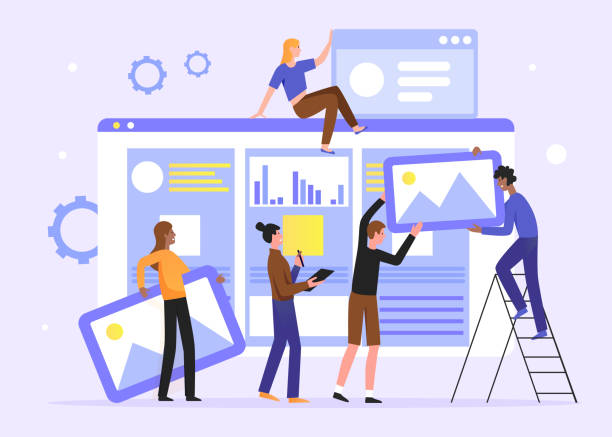
Choosing the right platform is one of the most critical decisions in the e-commerce website design process, directly impacting future capabilities, costs, and ease of website management.
Various platforms with different features and pricing models are available.
Open-source platforms like WooCommerce, which is a WordPress plugin, offer very high flexibility and full control over the site’s code and appearance, but may require more technical knowledge for setup and maintenance.
SaaS (Software as a Service) platforms like Shopify are easier to set up and manage, eliminating concerns about hosting and security, but offer less flexibility in customization and have fixed monthly costs.
Magento is also suitable for large businesses with complex needs, but has high complexity and cost.
The optimal choice depends on your budget, your team’s technical knowledge, business size, and long-term goals.
Before making a final decision, carefully review the features, costs, scalability, support, and security of each platform to choose the best option for launching your online store.
| Feature | WooCommerce | Shopify | Magento |
|---|---|---|---|
| Model | Open-Source | SaaS (Software as a Service) | Open-Source / Enterprise |
| Ease of Use | Medium (Requires WordPress knowledge) | Easy | Difficult (Requires expertise) |
| Flexibility | High | Medium | Very High |
| Initial Cost | Hosting and theme (Relatively low) | Monthly plans (Medium) | High (Implementation and maintenance) |
| Suitable for | Small and medium-sized businesses | Small and medium-sized businesses | Large and complex businesses |
User Experience (UX) and User Interface (UI) Design in Online Stores
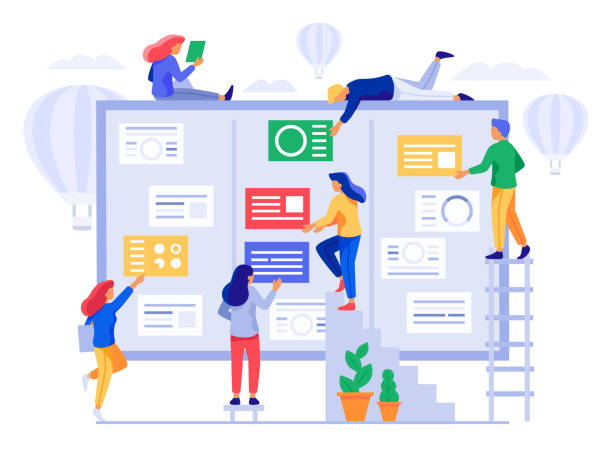
The success of an e-commerce website doesn’t solely depend on having good products; it’s greatly influenced by its User Experience (UX) and User Interface (UI).
User Experience (UX) design focuses on the user’s feelings and interaction with the website, aiming to create a smooth and enjoyable shopping journey.
This includes easy navigation, a simple payment process, fast loading speed, and responsiveness for correct display on various devices (mobile, tablet, desktop).
A strong UX encourages users to stay longer on the site, view more products, and ultimately make a purchase.
On the other hand, User Interface (UI) relates to the visual and aesthetic aspects of the website.
Appropriate color schemes, readable fonts, high-quality product images, and organized element layout all contribute to creating an attractive and professional UI.
The combination of a beautiful UI and a functional UX builds customer trust and assures them they are interacting with a reputable online store.
In e-commerce website design, both UX and UI aspects must be considered harmoniously and with high precision to ensure customers complete their purchases with full satisfaction and are inclined to return to your website.
Ignoring either of these two factors can lead to customer loss and reduced conversion rates.
How much does losing business leads due to an unprofessional website cost you? Solve this problem forever with professional corporate website design by Rasawweb!
✅ Increased credibility and trust among potential customers
✅ Easier acquisition of new business leads
⚡ Get a free consultation right now!
SEO for Increasing E-commerce Website Traffic
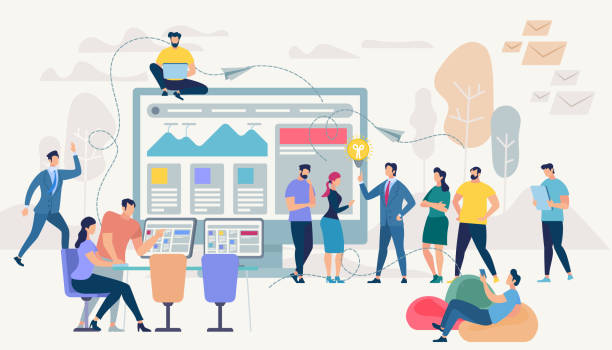
Having a beautiful and functional e-commerce website is only half the battle; the other half is getting it seen by potential customers.
This is where SEO (Search Engine Optimization) comes in.
SEO is a set of techniques that helps your website rank higher in Google search results and other search engines.
For an online store, SEO is critically important because most online shoppers begin their search through search engines.
Keyword research is the first step in an SEO strategy; you need to know what phrases your customers search for to find your products.
Then, these keywords should be strategically included in product titles, descriptions, page URLs, and meta descriptions (On-Page SEO).
Site loading speed, mobile compatibility, and proper internal linking structure are also important technical factors in SEO.
Furthermore, creating valuable content like blog articles about products or buying guides can increase organic traffic.
An e-commerce website designed with SEO principles from the outset can reduce marketing costs in the long run and significantly increase sales.
This is a long-term investment that yields sustainable results.
Why is E-commerce Website Security Crucial?
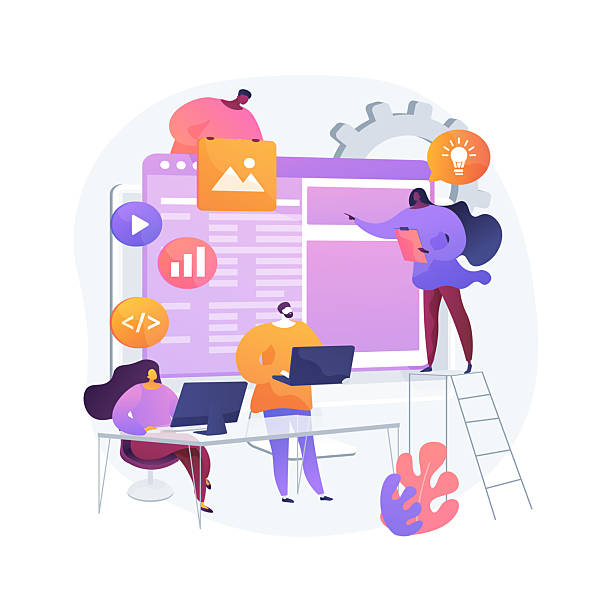
In the digital age, where cyber attacks are becoming increasingly complex, the security of your e-commerce website is critically important.
A security breach can not only lead to the loss of sensitive customer data (such as credit card information and personal details) but also severely damage your brand’s reputation and erode customer trust.
Using an SSL (Secure Sockets Layer) certificate, which encrypts communications between the user and the server, is the first and most fundamental step.
This certificate displays a padlock icon next to the website address and uses the HTTPS protocol, which is a sign of security for Google and users.
In addition to SSL, using secure and reputable payment gateways, strong encryption for user data, regular updates of the content management system and plugins, and performing regular backups of website information are other essential measures.
Furthermore, using Web Application Firewalls (WAFs) and continuous monitoring for suspicious activities can help detect and prevent attacks.
Failure to prioritize security can have irreparable consequences for your business.
In the process of e-commerce website design, security must be considered a top priority from the very beginning and throughout all stages to prevent any potential damage and ensure peace of mind for your customers and your business.
Digital Marketing and Growth Strategies for Online Stores

After completing the e-commerce website design, the next step is customer acquisition and sales growth, which is achieved through digital marketing strategies.
Digital marketing encompasses a wide range of tools and tactics that help you reach your target audience and convert them into customers.
Content marketing, such as creating informative blogs, videos, and buying guides, not only aids SEO but also creates added value for users and directs them to your website.
Social media marketing also plays a significant role; an active presence on platforms like Instagram, Telegram, and Twitter allows for direct interaction with customers, product display, and the creation of engaging advertising campaigns.
Email marketing campaigns are highly effective tools for announcing discounts, new products, and reminding customers about abandoned carts.
Paid advertising (such as Google Ads and social media ads) can also drive targeted and fast traffic to your website.
Furthermore, offering special discounts, customer loyalty programs, and engaging contests can help attract and retain customers.
All these strategies must be implemented cohesively and with an analytical approach to yield the best results for your online store’s growth and success, and to maintain dynamism in the market.
| Channel | Description | Impact on Traffic | Impact on Sales |
|---|---|---|---|
| SEO | Optimization for search engines | High and Organic | Medium to High (Long-term) |
| Content Marketing | Creation of valuable content (blog, video) | Medium to High | Medium (Aids SEO and trust) |
| Social Media Advertising | Targeted campaigns on platforms | High and Targeted | High and Fast |
| Email Marketing | Sending promotional and informational emails | Medium (Customer return) | High (Good conversion rate) |
| Google Ads | Advertising in Google search results | Very High and Targeted | Very High (Fast and direct) |
Support and Maintenance for a Successful E-commerce Website

Launching an online store is just the beginning; its success and sustainability depend on regular and effective support and maintenance.
An active and high-traffic e-commerce website requires continuous care to always operate optimally and provide a satisfactory user experience.
Regular software updates, both in the content management system and in plugins and themes, are essential for maintaining security and compatibility with the latest technologies.
Ignoring these updates can expose the site to security vulnerabilities or cause malfunctions.
Regular backups of all website data, including product information, orders, and user databases, are among the most crucial measures to prevent disaster in case of technical issues or cyberattacks.
Furthermore, monitoring site performance in terms of loading speed and resolving potential errors, optimizing images and CSS/JS codes, all play a role in increasing efficiency and user satisfaction.
Providing customer support is also an integral part of maintenance; prompt answering of questions, resolving order issues, and offering guidance help build customer trust and loyalty.
Finally, collaborating with a professional support team in e-commerce website design can assure you that your website is always in its best state and ready to meet customer needs.
Does your current website inspire the trust that potential customers should have in your business? If the answer is no, it’s time to get your professional and impactful corporate website with Rasawweb.
✅ Fully custom design tailored to your brand identity
✅ Increased lead generation and business credibility in customers’ eyes⚡ Contact us for a free consultation!
Future Trends in E-commerce Website Design and E-commerce
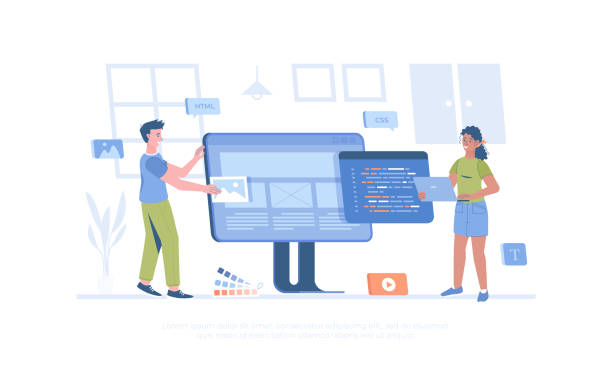
The world of e-commerce is constantly evolving, and emerging technologies are shaping the future of e-commerce website design.
Awareness of these trends is crucial for maintaining competitiveness.
Artificial Intelligence (AI) and Machine Learning (ML) play an increasing role in personalizing the shopping experience; from product recommendations based on user behavior to intelligent chatbots for customer support.
Augmented Reality (AR) and Virtual Reality (VR) also allow customers to virtually try products in their real-world environment or have an immersive store experience, which significantly helps reduce return rates and increase customer confidence.
Voice search is also expanding, and websites need to be optimized to respond to voice commands.
Sustainability and social responsibility have also become important factors for consumers; stores that emphasize sustainability and ethics in their product manufacturing can attract more customers.
Furthermore, contactless payments and cryptocurrencies diversify payment gateways and increase transaction speed and security.
Integration with social platforms (Social Commerce) is also growing significantly, enabling direct purchases through social networks.
These trends indicate that the future of e-commerce websites will be dynamic and innovation-driven.
Is Investing in E-commerce Website Design Really Profitable?
![]()
Investing in e-commerce website design is a question many businesses ask themselves before entering the online world.
The unequivocal answer is yes, but only if it’s accompanied by meticulous planning, a strong strategy, and correct execution.
Initially, there might be costs for design, development, hosting, and initial marketing, which can seem challenging for some businesses.
However, it’s important to note that an online store, unlike physical stores, has no time or geographical limitations.
You can reach your customers 24/7 from anywhere in the world.
This provides unlimited growth potential that is less common in traditional business models.
Reduced operational costs such as rent, sales staff salaries, and utility bills can lead to significant long-term savings.
Furthermore, the analytical data obtained from an e-commerce website allows you to better understand customer behavior and optimize your marketing and sales decisions.
With a positive Return on Investment (ROI) and high scalability, creating an e-commerce website is not only profitable but also enables businesses to have a powerful and sustainable presence in a competitive market.
Frequently Asked Questions
| Row | Question | Answer |
|---|---|---|
| 1 | What is an e-commerce website? | It is a website that allows for the online buying and selling of products or services, enabling users to view, select, and purchase products. |
| 2 | Why do we need e-commerce website design? | With an e-commerce website, businesses can reach a wider audience, operate 24/7, reduce operational costs, and increase their sales. |
| 3 | What are the main features of a successful e-commerce website? | Product catalog, shopping cart, secure payment gateway, order management system, user panel, product search and filter capabilities, and responsive design. |
| 4 | What are the common platforms for e-commerce website design? | Common platforms include WordPress (with WooCommerce plugin), Shopify, Magento, PrestaShop, or custom design (coding from scratch). |
| 5 | What is the importance of User Interface (UI) and User Experience (UX) in e-commerce website design? | Proper UI/UX design improves customer experience, reduces bounce rate, increases user time on the site, and ultimately boosts conversion rates and sales. |
| 6 | What are the key steps in designing an e-commerce website? | These steps include planning and research, visual and UI design, technical development and coding, content entry, testing and debugging, launch, and support. |
| 7 | What is the importance of security in e-commerce websites? | Security is crucial for protecting sensitive user information (like payment and personal details) and building customer trust. Using an SSL certificate and secure payment gateways is essential. |
| 8 | What does SEO mean for an e-commerce website? | It means optimizing the website for search engines like Google so that product and category pages appear higher in search results, attracting more organic (free) traffic. |
| 9 | What is the role of payment gateways in an e-commerce website? | A payment gateway is the bridge between the customer and the bank, enabling secure and online financial transactions and transferring money from the customer’s account to the seller’s account. |
| 10 | What does Responsive Design mean for an e-commerce website? | It means that the e-commerce website should display correctly and be easy to use on any device (mobile, tablet, laptop), without losing information or disrupting its appearance. |
And other services of Rasawweb Advertising Agency in the field of advertising
Smart Direct Marketing: An effective tool for campaign management with custom programming.
Smart Link Building: Designed for businesses seeking online growth through precise audience targeting.
Smart Brand Identity: An effective tool for increasing click-through rates with attractive UI design.
Smart Marketing Automation: A combination of creativity and technology to attract customers by optimizing key pages.
Smart Digital Branding: A fast and efficient solution for increasing website traffic with a focus on intelligent data analysis.
And over a hundred other services in internet advertising, advertising consultation, and organizational solutions
Internet Advertising | Advertising Strategy | Advertorial
Resources
Principles of Successful E-commerce Website Design
Comprehensive Guide to Building an Online Store from Scratch
Increasing Online Sales with Modern E-commerce Website Design
Review of the Best E-commerce Website Templates for 2023
❓ Are you ready to transform your business in the digital world? Rasawweb Afarin Digital Marketing Agency, by offering innovative and specialized solutions, including fast website design and professional optimization, assists you on the path to growth and success. For a powerful online presence and attracting more customers, contact us today.
📍 Tehran, Mirdamad Street, next to Bank Markazi, Southern Kazeroon Alley, Ramin Alley, No. 6


